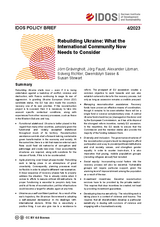Policy Brief
Rebuilding Ukraine: what the international community now needs to consider
Grävingholt, Jörn / Jörg Faust / Alexander Libman / Solveig Richter / Gwendolyn Sasse / Susan StewartPolicy Brief (4/2023)
Bonn: German Institute of Development and Sustainability (IDOS)
DOI: https://doi.org/10.23661/ipb4.2023
Dt. Ausg. u.d.T.:
Wiederaufbau in der Ukraine: Was die internationale Gemeinschaft jetzt beachten muss
(Policy Brief 2/2023)
Rebuilding Ukraine starts now – even if it is being undertaken against a backdrop of conflict, violence and destruction, with Russia continuing to wage its war of aggression. In granting Ukraine European Union (EU) candidate status, the EU has also made the country’s recovery one of its own priorities. If this reconstruction project is to succeed, then it is necessary to take into account specific contextual conditions, along with experiences from other recovery processes, such as those in the Western Balkans and Iraq.
• Functional statehood: Ukraine is better placed in this regard than many other countries, particularly given the functional and widely accepted statehood throughout much of its territory. Reconstruction assistance can kick-start a forward-looking, sustainable green transformation in the economy and society. At the same time, there is a risk that massive external cash flows could feed old networks of corruption and patronage and create new ones. Clear accountability structures are required, along with sanctions for the misuse of funds, if this is to be counteracted.
• Agile planning over linear phase model: Rebuilding work is taking place in an atmosphere of great uncertainty. Consequently, planning processes must be flexible in order to adapt to different war scenarios. A linear sequence of recovery phases fails to properly address the situation. This is already visible when it comes to efforts to secure critical infrastructure. Its proper functioning is essential to people’s daily lives and to all forms of reconstruction, yet this infrastructure could become a target for attacks again at any time.
• Ukraine as a self-confident partner: As a result of the war’s trajectory, the Ukrainian Government is adopting a self-assured demeanour in its dealings with international donors. While this is essentially a positive thing, it can also give rise to a resistance to reform. The prospect of EU accession creates a common objective to work towards and can also establish coherent criteria for the recovery process, but only as long as accession remains a credible prospect.
• Managing reconstruction assistance: Recovery funds have proven an effective means of coordination, though it remains to be seen whether there will be a single fund or several complementary ones. A central Ukraine fund should be (co-)managed on the donor end by the European Commission, as it has at its disposal the strongest reform incentive, namely EU accession. In the meantime, the EU needs to ensure that the Commission and the member states also provide the majority of the funding between them.
• Diversity and inclusion: The governance structures of the reconstruction project should be designed to afford participation and a say to pluralist political institutions and civil society voices, and strengthen gender equality. In order to counter brain-drain, it is also imperative that young, mobile population groups (including refugees abroad) feel included.
• Social equity: Incorporating social factors into the recovery process will also be essential. Vulnerable groups will require particular support, given the alarming level of impoverishment among the population as a result of the war.
• Investment incentives: Essential reconstruction services have to be provided by the private sector. This requires that clear incentives be created, not least by providing investment guarantees.
• Developing trauma sensitivity: The rebuilding work is taking place in a context of violence and trauma. This requires that all stakeholders develop a particular sensitivity in dealing with survivors of violence and engaging with a traumatised society.
Kontakt
Cornelia Hornschild
Koordinatorin Publikationen
E-Mail Cornelia.Hornschild@idos-research.de
Telefon +49 (0)228 94927-135
Fax +49 (0)228 94927-130
Alexandra Fante
Bibliothekarin/Open Access-Koordinatorin
E-Mail Alexandra.Fante@idos-research.de
Telefon +49 (0)228 94927-321
Fax +49 (0)228 94927-130




